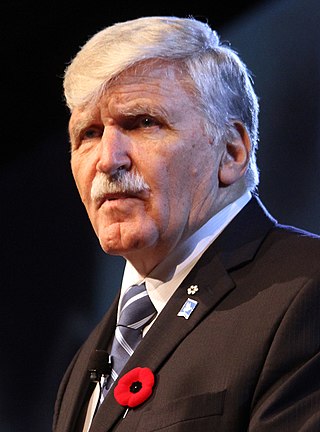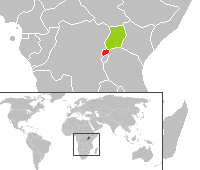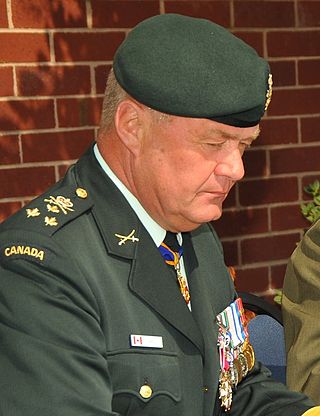Related Research Articles
Lieutenant General John Murray Sanderson, is a retired senior Australian Army officer and vice-regal representative. He served as Force Commander of the United Nations Transitional Authority in Cambodia from 1992 to 1993, Chief of Army from 1995 to 1998, and was the 29th Governor of Western Australia from 2000 to 2005.

Roméo Antonius Dallaire is a Canadian retired politician and military officer who was a senator from Quebec from 2005 to 2014, and a lieutenant-general in the Canadian Armed Forces. He notably was the force commander of UNAMIR, the ill-fated United Nations peacekeeping force for Rwanda between 1993 and 1994, and for trying to stop the genocide that was being waged by Hutu extremists against Tutsis. Dallaire is a Senior Fellow at the Montreal Institute for Genocide and Human Rights Studies (MIGS) and co-director of the MIGS Will to Intervene Project.

The United Nations Assistance Mission for Rwanda (UNAMIR) was established by United Nations Security Council Resolution 872 on 5 October 1993. It was intended to assist in the implementation of the Arusha Accords, signed on 4 August 1993, which was meant to end the Rwandan Civil War. The mission lasted from October 1993 to March 1996. Its activities were meant to aid the peace process between the Hutu-dominated Rwandese government and the Tutsi-dominated rebel Rwandan Patriotic Front (RPF). The UNAMIR has received much attention for its role in failing, due to the limitations of its rules of engagement, to prevent the Rwandan genocide and outbreak of fighting. Its mandate extended past the RPF overthrow of the government and into the Great Lakes refugee crisis. The mission is thus regarded as a major failure.

The United Nations Observer Mission Uganda–Rwanda (UNOMUR) was a peacekeeping mission established by the United Nations Security Council in Resolution 846 and lasted from June 1993 to September 1994. Its mission was "to monitor the border between Uganda and Rwanda and verify that no military assistance was being provided across it". It was based in Kabale, Uganda and its mandate thus covered 193 miles of border. Countries contributing to UNOMUR included Bangladesh, Botswana, Brazil, Hungary, the Netherlands, Senegal, Slovakia and Zimbabwe.

Joseph Gérard Maurice Baril, is a retired General officer in the Canadian Forces, a Military Advisor to the United Nations Secretary-General & head of the Military Division of the Department of Peacekeeping Operations of the United Nations from 1992 to 1997, and Chief of the Defence Staff in Canada from 1997 to 2001.

The assassination of presidents Juvénal Habyarimana and Cyprien Ntaryamira in the evening of April 6, 1994 was the proximate trigger for the Rwandan genocide, which resulted in the murder of approximately 800,000 Tutsi and a smaller number of moderate Hutu. The first few days following the assassinations included a number of key events that shaped the subsequent course of the genocide. These included: the seizing of power by an interim government directed by the hard-line Akazu clique; the liquidation of opposition Hutu politicians; the implementation of plans to carry out a genocide throughout the country; and the murder of United Nations peacekeepers, contributing to the impulse of the international community to refrain from intervention.

The failure of the international community to effectively respond to the Rwandan genocide of 1994 has been the subject of significant criticism. During a period of around 100 days, between 7 April and 15 July, an estimated 500,000-1,100,000 Rwandans, mostly Tutsi and moderate Hutu, were murdered by Interahamwe militias.
Augustin Ndindiliyimana is a former Rwandan General and Chief of the Rwandan National Gendarmerie. He was convicted of genocide by the International Criminal Tribunal for Rwanda but he was acquitted by the tribunal upon appeal.
Lieutenant General Siva Kumar, AVSM VSM is an Indian former commander. He was the third and final Force commander of UN troops serving in Rwanda.

Jan Arp is a senior officer in the Canadian Forces. Appointed in January 2007, he is Chief of Staff at NATO's Headquarters Supreme Allied Command Transformation.
Iqbal Riza is a retired Pakistani diplomat. He is currently a special adviser to the Secretary-General of the United Nations, and has worked for Spanish Foundation Concordia 21. He served as the Chef de Cabinet to United Nations Secretary-General Kofi Annan from his appointment at the beginning of Annan's term in January 1997 until his retirement January 15, 2005.

General Tissa Indraka Weeratunga, VSV was a Sri Lankan general. He was the former Commander of the Sri Lankan Army and the first General Officer Commanding (GOC) of the Joint Operations Headquarters (JOH), he was later Sri Lanka's High Commissioner to Canada.
15 (Edmonton) Field Ambulance is a Canadian Forces Primary Reserve medical unit headquartered in Edmonton, Alberta, with a detachment in Calgary. The unit's mission is to attract, train, force generate and retain high-quality health service personnel to provide health service support to the 41 Canadian Brigade Group and to augment CF's domestic and international operations. An additional and important activity is to participate in activities that will raise its profile in Edmonton and Calgary.

Stefan Steć was a major of the Polish Armed Forces. In 1994, he served as a peacekeeper in the UNAMIR forces in Rwanda under general Roméo Dallaire. For his dedication in saving lives during Rwandan genocide at the risk to his own, he was awarded the Cross of Merit for Bravery by Polish President Lech Wałęsa. He died at the age of 40 due to complications from posttraumatic stress disorder.
Henry Kwami Anyidoho is a former Ghanaian military officer.

Colonel Luc Marchal is a retired officer of the armed forces of Belgium. He is known for being the senior officer in the Belgian peacekeeping contingent during the 1994 Rwandan genocide, as well as the United Nations Assistance Mission for Rwanda (UNAMIR) sector commander for the capital Kigali.

Franciszek Gągor was a Polish general, Chief of the General Staff of the Polish Armed Forces between 2006 and 2010.

United Nations Security Council resolution 918 was adopted without a vote on 17 May 1994. After reaffirming all resolutions on the situation in Rwanda, particularly resolutions 872 (1993), 909 (1994) and 912 (1994), the Council expressed its alarm and condemnation at the continuing large-scale violence, and went on to impose an arms embargo on the country and authorise an expansion of the United Nations Assistance Mission for Rwanda (UNAMIR).

Michael Beary is a retired Irish Army Major general and former head of mission and force commander of the United Nations Interim Force in Lebanon (UNIFIL). Beary is the current leader of the UN Mission to Support the Hodeidah Agreement having retired from the military.
Jennie Carignan is a lieutenant-general in the Canadian Armed Forces (CAF).
References
- "Canadian Who's Who 1997 entry" . Retrieved February 23, 2006.